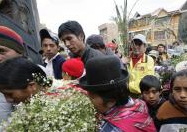Bolivia wants better ties with next U.S. government
November 2, 2008 - Reuters
By Carlos Quiroga
CHIMORE, Bolivia (Reuters) - Bolivia said on Sunday it hopes to normalize relations with the next U.S. government, a day after accusing American anti-drug agents of spying and barring them from fighting cocaine traffickers until further notice.
Leftist president Evo Morales on Saturday accused U.S. Drug Enforcement Administration agents of conspiring with and financing anti-government groups that staged violent protests in eastern and central regions governed by the opposition in September.
The same month tensions had flared when Morales expelled the U.S. ambassador after accusing him of meddling and backing his political rivals.
"As the president said, we are talking about an indefinite suspension (of DEA activity), nothing more," government minister Alfredo Rada told reporters in Chimore in the coca-growing region of Chapare in central Bolivia.
"We hope we can improve relations with the next U.S. government and reactivate cooperation, not just against drugs," Rada added. The DEA used to operate a base in the area.
Democrat Barack Obama and Republican John McCain face off in Tuesday's U.S. presidential election, and Obama has the edge in opinion polls. The winner takes over from Republican President George W. Bush in January.
Impoverished Bolivia is the world's third-largest cocaine producer after Colombia and Peru. Last month, the United States added Bolivia to a list of states that had "failed demonstrably" to meet their counter-narcotics obligations.
The United States on Saturday called Morales' accusations false and absurd.
The U.S. government has taken steps to suspend trade benefits for Bolivia because of what officials described as its poor cooperation in fighting drug trafficking.
Washington says coca acreage in Bolivia has increased significantly, but the Morales government says it rose only 5 percent last year.
Since taking office in 2006, Morales has pursued a policy of "zero cocaine but not zero coca," which gives tens of thousands of farmers permission to grow coca on small plots for legal uses.
The coca leaf is the main ingredient for cocaine but it is also widely used by Bolivian Indians, who chew it for its medicinal and nutritional properties.
Morales built his political career as a leader of Bolivia's coca growers and wants to develop legal markets for coca leaves while fighting the cocaine trade.
(Editing by Simon Gardner; editing by Mohammad Zargham)
